8 Best Dental Tips for Quarantine (Overdue for a Cleaning? Read This!)
To ensure your safety and health, dental offices across the world have temporarily closed their doors and postponed elective dental treatments.
The most common elective dental procedure is a professional dental cleaning, which removes decay-causing plaque from your teeth and gumline.
This is an essential part of your dental hygiene routine. However, in crisis times like this, it can wait!
But a little extra precaution between now and when you can safely revisit your dentist wouldn’t hurt!
So, in this blog, you will discover our list of new and familiar dental tips for quarantine life. Let’s get started!

The 8 best dental tips for quarantine life
Ok, let’s just get the most obvious dental tips out of the way, but read carefully, it’s not what you’d expect!
1. Brush and floss
Typically, we recommend brushing your teeth twice a day. However, if you’re guilty of snacking more or eating outside your normal diet during quarantine, you should consider brushing after every meal, especially if you’re past due for a dental cleaning.
As for flossing, now is a good time to be honest about how often you floss. Do you really do it every day?
Try flossing once a day while quarantined, and before you know it, it’ll become an established part of your normal hygiene routine even when things return to normal.
2. Listen to music
Guess what all these songs have in common:
- “I Will” by The Beatles
- “Flowers in Your Hair” by The Lumineers
- “Shut Down” by The Beach Boys
- “The Way I am” by Ingrid Michaelson
They are all short songs close to 2-minutes long… the recommended length of time you should brush your teeth!
Listening to music can help you keep track of how long you’re brushing your teeth. Plus, it makes this mundane task fun!
You can also listen to longer songs and note the 2-minute mark.
3. Drink more water
Most water sources in the US contain fluoride, which is extremely effective in fighting cavities.
Fluoride remineralizes your teeth after eating and drinking, and can even reverse early signs of decay.
Not to mention, water is essential for your overall health too.
4. Re-organize your bathroom
One thing this pandemic has taught us is to enjoy the little things in life!
For example:
Making your bathroom vanity a clean, inviting space that doesn’t induce stress.
Try this:
- Remove everything from your drawers, countertops, and cabinets
- Disinfect all the surfaces and handles (don’t forget the mirror!)
- Toss or donate unnecessary, unused, or expired items
- Group your items by category (hair, dental, cleaning supplies, his vs. her, etc.)
- Place your regularly used items in an accessible drawer or on the countertop (but try to minimize countertop clutter)
- Place seasonal stuff in those harder to reach spots
When all your items have a designated place to go, it’ll make it that much easier to find what you need and keep it clean.
5. Keep a routine
Stay-at-home orders have drastically changed our traditional daily routines; work, buying groceries, school, bedtime, you name it.
This can impact your health, even if you keep brushing and flossing.
For example, if you now eat closer to bedtime, your digestive system will be running through the night, and you may not get restful sleep.
One trick to help this:
Brush your teeth at the same time each night or aim for 2 hours before bed. This will help stop you from eating too close to bedtime, and it’ll hold you accountable for maintaining your oral health routine.
6. Remove these from your diet
This list of food and drinks is associated with cavities and dental emergencies. We recommend avoiding these entirely, especially during quarantine!
- Chewing ice: Even though it’s water, its hard surface can chip and break teeth and enamel.
- Citrus: Lemonade, limes, etc. all contain acidity, which eats away your enamel.
- Coffee and tea: In their natural form, they aren’t that bad, but it’s when you add sugar and caffeine into the mix that can cause problems.
- Sticky foods: From dried fruit to sour candy, these sticky foods tend to, you guessed it, STICK to your teeth.
- Starches: Watch out for leftover chips and cereal getting trapped between your teeth all day.
- Soda: Avoid regular and diet soda because of its extremely high level of acidity.
- Alcohol: Drinking alcohol dries out your mouth and dehydrates you, which slows down your saliva production, allowing harmful bacteria to do more damage.
We understand removing all these things from your diet may be unrealistic. So try your best and when in doubt, drink water right after eating or drinking other liquids to help rinse away harmful bacteria.
7. Prevent an emergency dental visit
There’s never a good time to have an emergency, but now is an especially unfavorable time.
With these tips, you can improve your chances of avoiding a dental emergency – during and after quarantine:
- Don’t use your teeth to open things like packages or bottles
- Maintain a good hygiene routine
- Don’t chew on hard things like ice, popcorn kernels, or pencils
- Wear a mouthguard while playing sports
- Reschedule your dental appointment after quarantine
Another important dental tip:
Replace your toothbrush if you are sick. Toothbrushes can hold bacteria, which can worsen your illness or pass it onto others if you keep toothbrushes close together.
Also, keep your toothbrush in a well-ventilated drawer or area, so bacteria doesn’t grow.
8. Don’t delay emergency dental care
While most dental offices are temporarily closed, many of them are still open for dental emergencies, like our Muncie dentist.
If you experience a dental emergency, call your dentist right away. The sooner you can, the better your outcome will be.
What is a dental emergency?
Here’s a general overview of what the American Dental Association… This text opens a new tab to the ADA PDF on dental emergencies… considers a dental emergency:
- Knocked out tooth
- Tooth fracture causing pain or gum trauma
- Severe dental pain
- Swelling of your gums, face, or neck
- Bleeding in your mouth
- Abscess or infection causing pain or swelling
- Damaged, lost, or non-functional restorations
Need to contact an emergency dentist during quarantine?
Dr. Greg Pyle is available for dental emergencies!
Our dental office, University Avenue Dental, is located in Muncie, IN and serves the surrounding communities of Anderson, Yorktown, Selma, Middletown Park, and New Castle.
What was your favorite quarantine dental tip?
Let us know in the comments!
And don’t forget to share this article with your friends and family to help keep them safe and healthy during COVID-19.
